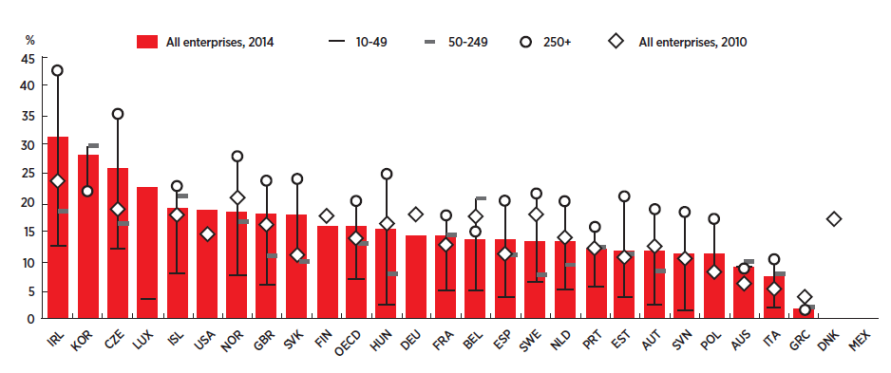At the beginning of the 21st century money is becoming obsolete. Electronic cash, electronic and online transactions have revolutionized the world economy, in such way where businesses and consumers can interact virtually. Business-to-consumer (B2C) commerce began taking off when online retailer such as Amazon.com created billion dollar industries by providing consumers with products and services that were cheaper and easier to get online than by going to shopping mall. The E-hubs and e-marketplaces provide a much wider range of suppliers and trading partners, leading to lower prices and increased productivity for the businesses. It used to be that majority of the electronic transactions were concentrated in a wealthy countries, however digital economy had spread across the globe.
The rapid growth of the digital economy poses challenges for international taxation. It is vital to examine how enterprises of the digital economy make their profits and add value in order to determine whether and to what extend it is necessary to adopt new taxation rules and prevent base erosion and profit shifting. Furthermore, countries are discussing how to ensure the effective collection of value added tax (VAT) with respect to the cross-border supply of digital goods and services. The digital economy continues to develop and it is important to work out the options to address the tax challenges at international and local levels in order to avoid profit shifting and base erosion.
“Ottawa Principles” such as neutrality, efficiency, certainty and simplicity, effectiveness and fairness, and flexibility are still relevant today and provide basis to evaluate options to address the tax challenges of the digital economy.
TAX CHALLENGES OF DIRECT AND INDIRECT TAXATION IN THE DIGITAL ECONOMY
Difficulties that the digital economy poses for the application of international tax rules are correlated to direct and indirect taxation.
In connection with direct taxation, the common features of tax planning that raise base erosion and profit shifting’s concerns could be following: minimization of tax in the source country either by avoiding a taxable presence or by maximizing deductions where there is such a presence, low or no withholding tax at source.
In relation to VAT, the areas of base erosion and profit shifting’s concerns could be VAT avoidance or reduction. Countries exercise different models of taxation, in particular the definition of source of taxation is varies from country to country. On the one hand, it is important to define the source of taxation and on the other hand, to monitor and enforce the regulation in practice.
OPTIONS TO ADDRESS THE TAX CHALLENGES OF THE DIGITAL ECONOMY
OECD has proposed specific options to address challenges of the digital economy such as: modifications to the exemption from Permanent Establishment (PE) status, withholding tax on digital transactions etc.
According to the OECD recommendations it is important to modify the list of exceptions related to the definition of PE. The new rules have to be introduced to ensure that no benefits will be received through fragmentation of business activities most probably among related companies and it has to be ensured that exceptions related to PE definition are restricted to activities that are otherwise of a “preparatory or auxiliary” character. To illustrate, the maintenance of a typical warehouse which operates for purposes of storing and delivering goods sold online to customers by an online seller of physical products would constitute a PE for that seller. This business model has to be deemed as a PE under the new international standard and taxed accordingly. I believe Georgian Double Taxation Avoidance (DTA) Treaty network has to be reviewed in line with good practices in order to avoid base erosion and profit shifting.
Digital economy creates challenges for VAT collection, especially on cross-border transactions. For such cases OECD recommends to apply the principles of the international VAT guidelines. In Georgia’s case taxation of electronic services are well regulated. Namely, if service recipient and provider persons are located in different countries, then the place of registration of the recipient of services or the place of management or the location of a permanent establishment of the recipient of services, if the services are directly related to such permanent establishment are deemed as a source for taxation.
Pursuant to the OECD recommendations artificial arrangements related to the PE have to be carefully analysed and addressed. Furthermore, guidance is needed to ensure that transfer pricing rules are effectively implemented and effective Controlled Foreign Company (CFC) rules are defined.
During the recent years, Georgia has adopted anti-avoidance regulations such as: transfer pricing regulation, thin capitalization. Transfer pricing regulation is in place since 2011, but the implementation is still at the initial stage. These rules needs broader analyses and step by step implementation. As to the CFC rules, Georgia has no such regulation and it is arguable, if we need to implement such anti-avoidance mechanism. As a result, adoption of a new anti-avoidance mechanism and incorrect implementation of transfer pricing rules could cost the Government a lot of money.
Withholding tax on digital transactions is one of the critical issues among others. To illustrate, it is possible for e-commerce provider to undertake economic activity in a territory in which it has no physical presence and avoid paying taxes. It is an option that certain payments made by residents of that territory to such providers, for digital goods or services, can be subject to a final withholding tax.
In summary digital economy is becoming the economy itself and tax challenges of this sector is growing rapidly. Therefore, policy makers have to adopt the strong and clear standards at international and local levels to effectively address the tax challenges of digital economy.
















